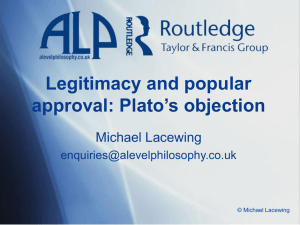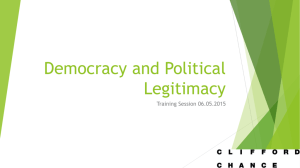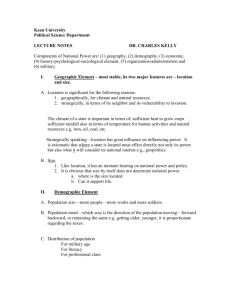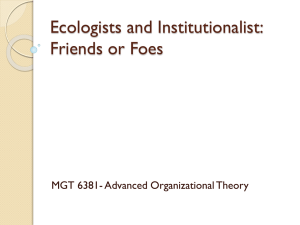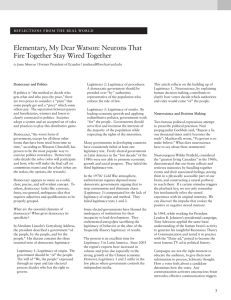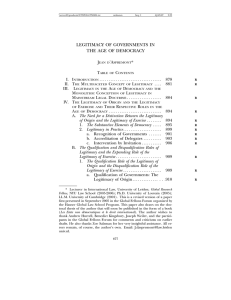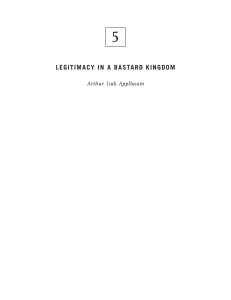Empirical legitimacy
advertisement
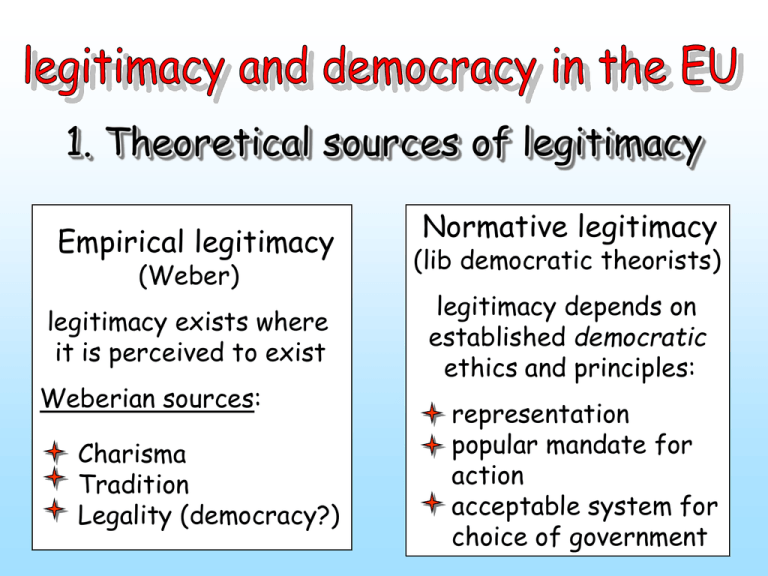
1. Theoretical sources of legitimacy Empirical legitimacy (Weber) legitimacy exists where it is perceived to exist Weberian sources: Charisma Tradition Legality (democracy?) Normative legitimacy (lib democratic theorists) legitimacy depends on established democratic ethics and principles: representation popular mandate for action acceptable system for choice of government 2. Problems for the EU (1) Empirical legitimacy no sources of Charisma Tradition how useful is legality in satisfying Weber’s criterion? 2. Problems for the EU (2) Normative legitimacy - Key elements of the democratic deficit Lack of clear lines of accountability (eg Commission President) No occasion on which the people choose amongst options European Council and Council of Ministers members mostly are elected, but at one stage removed and not on the basis of European issues EP is elected, but its powers are restricted, electoral turnouts are low, and elections are contested on national issues Policy processes do not conform to liberal democratic notions of transparency, accountability and participation 3. “traditional” solutions (1) Enhanced representation (Beetham & Lord 1998) direct election of Commission President enhanced EP powers but… electoral apathy how effective is the EP as the instrument of representative democracy? 3. “traditional” solutions (2) Confederal consociation (Tsinisizelis & Chryssochoou 1998) “mutual governance” (by national actors) EU legitimacy depends on state legitimacy but… (Beetham and Lord – 1998 – critique) EU has direct effect on citizens EP and Commission are supranational EU competences are expanding beyond those agreed EU has a political as well as economic/social mission Ministers may lose legitimacy if they fail at EU level 3. “traditional” solutions (3) non-majoritarian democracy (Majone 1996) majority rule is restrained by placing authority in the hands of non-accountable experts and technocrats working within guidelines imposed on them by EU politicians this is appropriate where policies are about regulation (economic, social, legal) i.e., in the EU case but… (Beetham & Lord – 1998 – critique) there is no such thing as “ideological neutrality” decision-making always depends on policy choices technocratic rule needs to complement, not compete with democratic choice present EU powers and competences are not universally accepted 4. “alternative” solutions (1) Input solutions – a new normative form? Participatory involvement (Multi-level governance?) sub-national govt; groups; parties participate people derive legitimacy from participation & feed it back to the EU but are people, or their groups empowered? multi-level participation is not the same thing as multi-level governance (Bache 1999) Enabling involvement (Abromeit, 1998) establishing veto rights on major EU policy initiatives to be exercised by groups and regions would slow things down -a good thing? but problem of enabling informed involvement 4. “alternative” solutions (2) Outcome (performance) solutions externalised legitimacy (Feldman 1999; Beetham & Lord 1998) gained by means of international “approval” eg development of peace community but… outcomes are disputable has the EU guaranteed peace beyond its immediate borders? EU citizenship (Beetham & Lord 1998) EU institutional legitimacy derived from sense of belonging eg: popular human rights EU constitution post-national citizenship thus EU democracy leads to EU demos (not the other way round) The EU is only a partially developed political system with the consequences that: it may require a different form of legitimisation it may require a different form of democracy with only limited powers in such key areas as foreign and defence policy, social redistribution, and taxation, it may not need such high standards of legitimisation and democratisation as states

